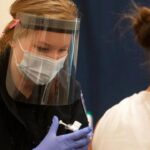After Acceptance
Online & Print Publication Options
We publish a seasonal journal available in-print and online, as well as exclusive web content year-round, at CollegeEMS.com. Our print journal is available via subscription. All content online is available to the public, open access.
Accepted manuscripts classified as Original Research, Case Reports, or Reviews are published in our print journal following double-blind peer review. The articles are also made available online, open access, immediately upon acceptance of the final versions.
Accepted manuscripts which undergo editorial review (News and Commentary, Perspectives and Opinions, Advice and Practices, Product Reviews, Letters to the Editor) are published online following editorial review; selected manuscripts in these categories are published in our print journal as well.
Accepted Images, Videos, Training Materials, or Agency Documents are published online, open access, following editorial review.
Advertisement Disclaimer
JCEMS publishes all content open access without charging authors a submission fee or article processing fee. In order to cover the costs associated with reviewing, publishing, and distributing content, JCEMS relies on the support of our sponsors and partners. By submitting an article or other content, you agree to have advertisements placed within, or next to, your article or other content regardless of whether your article is published in our print journal and/or website.
Placement of an advertisement in our print journal or website does not imply endorsement by JCEMS, the National Collegiate Emergency Medical Services Foundation, or any representatives, agents, or licensors. JCEMS may employ third party services which place advertisements on our website. Neither JCEMS, the National Collegiate Emergency Medical Services Foundation, or any representatives, agents, or licensors accept responsibility or liability for the content of third party advertisers.
If you identify an advertisement on our website that displays content, which you believe does not reflect the values or ethical standards of JCEMS, we urge you to contact our Editors at JCEMS@CollegeEMS.com. We pledge to quickly remove third party advertisements containing content that does not reflect our values or ethical standards.
Article Promotion
JCEMS maintains a robust social media platform to promote content. Published content will receive widespread recognition via posts on Facebook, Twitter, and LinkedIn. By submitting to JCEMS, authors declare that JCEMS may post your article or other content on social media platforms including, but not limited to, Facebook, Twitter, and LinkedIn. If an author does not wish for their published article or other content to be publicized or posted on any of our social media accounts, an author should contact our Editors at JCEMS@CollegeEMS.com. We will always respect the wishes of our authors to refrain from posting articles on our social media platforms.
We strongly encourage authors to widely disseminate their work, provided JCEMS and the authors are appropriately recognized. We encourage authors to post their articles and notices of publication in JCEMS on social media platforms, institutional websites, and news sources. We also encourage authors to share their work with the collegiate EMS community, their professional network, colleagues, and friends. We welcome questions from authors regarding best practices in publicizing their work.





